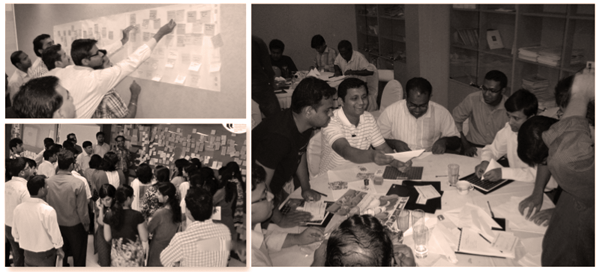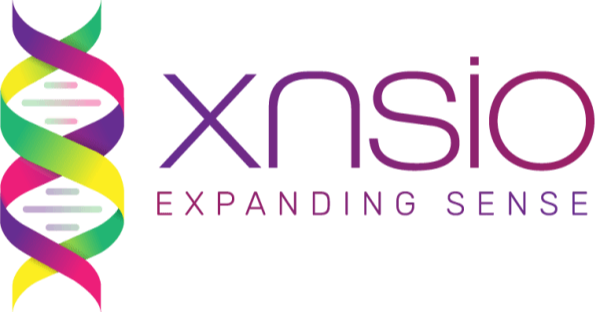Understand the thought process and the need for XP practices.
Get a First-Hand Feel of Agile Practices
Key takeaways and practical knowledge

At the end of this training the team will be able to:
Introduction to eXtreme Programming
- Introduction to TDD
- Test First Vs Test Last
- TDD Rhythm: Red, Green, Refactor
- Crucial Design Principles
- TDD and Design
- Avatars of TDD
- Purpose of Refactoring
- Common Code Smells
- Refactoring Patterns
- Using Automated Refactoring
- Why CI?
- Principles,Strategies and Techniques
- Setting up a CI server
- Automated Testing
- Applying CI to Large Projects
- How to Pair?
- Need for Pairing
- Pairing Infrastructure
- Pairing Styles
- The Big Picture
- Interaction Design with Low Fidelity Prototyping
- Capture nonfunctional requirements as stories
- Working with user proxies
- Conducting a story-writing workshop
- Planning with User Stories
- Setting up an automated build
- Creating automated unit, acceptance and UI tests
- Setting up a Continuous Integration (CI) process
- Setting up coding standards and adding code coverage or test coverage
- Setting up an integrated project dashboard
- Setting up a build promotion process and team wiki
Test Driven Development
Refactoring and Evolutionary Design
Continuous Integration
Pair Programming
User Stories
Planning Game
Project Automation
Collective Code Ownership
Informative Workspace and information radiators
Stand-up meetings and Dev Hurdles
Project Retrospectives
Benefits
All of our courses offer following benefits:
- Unlimited access to course materials, sample projects and code examples with relevant tools
- Low participant-to-instructor ratio
- Heavy focus on hands-on learning experience
- Live demos and real-world examples
- Interactive activities/simulations to help understand the essence and concepts
- Open discussion and dynamic format
- Customizable
Post training, if your team needs help, we’ll be happy to assist your team.

Instruction Method, Audience & Prerequisites
Method of Instruction
Transfer %
Target Audience
Course Level
Course Prerequisites
- Working experience in the project
- Highly Recommended: basic understanding of the life-cycle of software projects
Want to enroll or customize a training for your team?
Contact us to get started.
Training Details
Pricing
- Trainer Fee: Rs. 1,70,000 (~2000 USD) per day
- GST: Additional 18% GST applicable on all trainings delivered in India
- Expenses: Travel, accommodation and other expenses to be paid by the company
- No. of Participants: All our training have a cap of max 20 participants per training
Contact Details
If you are interested in any of the trainings listed here or interested in customizing these trainings to your needs, please contact us.
Timings
9:00 AM – 6:00PM
These trainings can also be conducted on a weekend if that works better for your team.
General Requirements
- HDMI projector (1024x768 minimum) & Projector screen.
- 1 White board & Dry erase markers.
- Cluster seating with 5-6 people on each table.
- 1 Flip chart with the stand and marker pens for each table.
- Notepad and Pen for each participant.
- Ample room for students in terms of room size and set up.
- For Dev trainings: at least one powerful workstation between two programmers.
- HDMI projector (1024x768 minimum) & Projector screen
- 1 White board & Dry erase markers.
- Cluster seating with 5-6 people on each table.
- 1 Flip chart with the stand and marker pens for each table.
- Notepad and Pen for each participant.
- Ample room for students in terms of room size and set up.
- For Dev trainings: at least one powerful workstation between two programmers
General Requirements
To ensure a successful workshop, we require the following facilities:
- HDMI projector (1024×768 minimum) & Projector screen
- 1 White board & Dry erase markers
- Cluster seating with 5-6 people on each table
- 1 Flip chart with the stand and marker pens for each table
- Notepad and Pen for each participant
- Ample room for students in terms of room size and set up
- For Dev trainings: at least one powerful workstation between two programmers
Development Tools
- Latest Java JDK
- Latest Standard Eclipse OR IntelliJ Idea
- JUnit, Mockito, JBehave, FitNesse or Cucumber
- Latest .Net Framework
- Latest Visual Studio
- Latest ReSharper Plugin
- Latest JetBrains Rider
- SpecFlow's Visual Studio IDE Integration or FitNesse
- Latest WebStorm JavaScript IDE
- Latest Chrome Browser
- Latest Jasmine Framework
- Latest Jest Framework
- Latest JsTestDriver
- Latest Eclipse CDT OR Visual Studio
- Latest GTest
- Latest Visual Studio
- Latest CLion
- Latest Flex SDK
- Latest Flash Builder OR IntelliJ Idea
Java
C#
JavaScript
C/C++
Ruby
PHP
Flex
Benefits
All of our courses offer following benefits:
- Unlimited access to course materials, sample projects and code examples with relevant tools
- Low participant-to-instructor ratio
- Heavy focus on hands-on learning experience
- Live demos and real-world examples
- Interactive activities/simulations to help understand the essence and concepts
- Open discussion and dynamic format
- Customizable
Post training, if your team needs help, we’ll be happy to assist your team.

Learning Outcome
At the end of this training the team will be able to:
- Understand the thought process and the need for XP practices
- Identify poorly designed code by using our elaborate code smell vocabulary.
- Learn various automated refactoring techniques and strategies to carefully clean the identified code smells.
- Have hands-on experience in practices like TDD, CI and Pair Programming
- Have experience in authoring User Stories
- Have clarity about Collective Code Ownership, Informative work spaces, planning game and project retrospectives
Course Outline
Introduction to eXtreme Programming
Test Driven Development
- Introduction to TDD
- Test First Vs Test Last
- TDD Rhythm: Red, Green, Refactor
- Crucial Design Principles
- TDD and Design
- Avatars of TDD
Refactoring and Evolutionary Design
- Purpose of Refactoring
- Common Code Smells
- Refactoring Patterns
- Using Automated Refactoring
Continuous Integration
- Why CI?
- Principles,Strategies and Techniques
- Setting up a CI server
- Automated Testing
- Applying CI to Large Projects
Pair Programming
- How to Pair?
- Need for Pairing
- Pairing Infrastructure
- Pairing Styles
User Stories
- The Big Picture
- Interaction Design with Low Fidelity Prototyping
- Capture nonfunctional requirements as stories
- Working with user proxies
- Conducting a story-writing workshop
- Planning with User Stories
Planning Game
Project Automation
- Setting up an automated build
- Creating automated unit, acceptance and UI tests
- Setting up a Continuous Integration (CI) process
- Setting up coding standards and adding code coverage or test coverage
- Setting up an integrated project dashboard
- Setting up a build promotion process and team wiki
Collective Code Ownership
Informative Workspace and information radiators
Stand-up meetings and Dev Hurdles
Project Retrospectives
Training Details
Method of Instruction
Interactive Dialogues, Programming Exercises, Demos and Instructional Games
Transfer %
Knowledge: 50%, Skill-Building: 50%
Target Audience
Entire Development Team wanting to experience eXtreme Programming in Action.
Course Level
Beginner to Intermediate
Course Prerequisites
- Working experience in the project
- Highly Recommended: basic understanding of the life-cycle of software projects
General Requirements
- HDMI projector (1024×768 minimum) & Projector screen
- 1 White board & Dry erase markers
- Cluster seating with 5-6 people on each table
- 1 Flip chart with the stand and marker pens for each table
- Notepad and Pen for each participant
- Ample room for students in terms of room size and set up
- For Dev trainings: at least one powerful workstation between two programmers
Development Tools
Java
- Latest Java JDK
- Latest Standard Eclipse OR IntelliJ Idea
- JUnit, Mockito, JBehave, FitNesse or Cucumber
C#
- Latest .Net Framework
- Latest Visual Studio
- Latest ReSharper Plugin
- Latest JetBrains Rider
- SpecFlow‘s Visual Studio IDE Integration or FitNesse
JavaScript
- Latest WebStorm JavaScript IDE
- Latest Chrome Browser
- Latest Jasmine Framework
- Latest Jest Framework
- Latest JsTestDriver
C/C++
- Latest Eclipse CDT OR Visual Studio
- Latest GTest
- Latest Visual Studio
- Latest CLion
Ruby
PHP
Flex
- Latest Flex SDK
- Latest Flash Builder OR IntelliJ Idea




